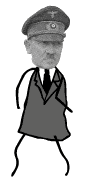
Hitler addresses his Generals
(Summary) May 23, 1939
Caution: Adolf Hitler was completely wrong about absolutely everything...usually. When Hitler said something that was actually correct, it was merely to set up the next lie. As with all good propagandists—and he certainly was that—he would begin with a few obvious, documented facts, and then proceed to distort them horribly. At any rate, the infamous German Führer’s worm-tongue rhetoric is NOT to be taken seriously, except as a classic example of the sort of masterful demagoguery from which appropriate lessons may hopefully be learned.As always, read with an abundant degree of cautious skepticism.
Germany had dropped from the circle of Great Powers. The balance of power had been effected without the participation of Germany. This equilibrium is disturbed when Germany's demands for the necessities of life make themselves felt, and Germany reemerges as a Great Power. All demands are regarded as 'Encroachments'. The English are more afraid of dangers in the economic sphere than of the simple threat of force. A mass of 80 million people has solved the ideological problems. So, too, must the economic problems be solved. No German can evade the creation of the necessary economic conditions for this. The solution of the problems demands courage. The principle, by which one evades solving the problem by adapting oneself to circumstances, is inadmissible. Circumstances must rather be adapted to aims. This is impossible without invasion of foreign states or attacks upon foreign property.
Living space, in proportion to the magnitude of the state, is the basis of all power. One may refuse for a time to face the problem, but finally it is solved one way or the other. The choice is between advancement or decline. In 15 or 20 years' time we shall be compelled to find a solution. No German statesman can evade the question longer than that. We are at present in a state of patriotic fervor, which is shared by two other nations: Italy and Japan. The period which lies behind us has indeed been put to good use. All measures have been taken in the correct sequence and in harmony with our aims. After 6 years, the situation is today as follows: The national-political unity of the Germans has been achieved, apart from minor exceptions.
Further successes cannot be attained without the shedding of blood. The demarcation of frontiers is of military importance. The Pole is no 'supplementary enemy'. Poland will always be on the side of our adversaries. In spite of treaties of friendship, Poland has always had the secret intention of exploiting every opportunity to do us harm. Danzig is not the subject of the dispute at all. It is a question of expanding our living space in the East and of securing our food supplies, of the settlement of the Baltic problem. Food supplies can be expected only from thinly populated areas. over and above the natural fertility, thorough-going German exploitation will enormously increase the surplus. There is no other possibility for Europe.
Colonies: Beware of gifts of colonial territory. This does not solve the food problem. Remember-blockade. If fate brings us into conflict with the West, the possession of extensive areas in the East will be advantageous. Upon record harvests we shall be able to rely even less in time of war than in peace. The population of non-German areas will perform no military service, and will be available as a source of labor. The Polish problem is inseparable from conflict with the West. Poland's internal power of resistance to Bolshevism is doubtful. Thus Poland is of doubtful value as a barrier against Russia. It is questionable whether military success in the West can be achieved by a quick decision, questionable too is the attitude of Poland. The Polish government will not resist pressure from Russia.
Poland sees danger in a German victory in the West, and will attempt to rob us of the victory. There is therefore no question of sparing Poland, and we are left with the decision: To attack Poland at the first suitable opportunity. [This sentence is underscored in the original German text.] We cannot expect a repetition of the Czech affair. There will be war. Our task is to isolate Poland. The success of the isolation will be decisive. Therefore, the Fuehrer must reserve the right to give the final order to attack. There must be no simultaneous conflict with the Western powers [France and England]. If it is not certain that a German-Polish conflict will not lead to war in the West, then the fight must be primarily against England and France.
Fundamentally therefore: conflict with Poland-beginning with an attack on Poland-will only be successful if the Western Powers keep out of it. If this is impossible, then it will be better to attack in the West and to settle Poland at the same time. The isolation of Poland is a matter of skillful politics. Japan is a weighty problem. Even if at first for various reasons her collaboration with us appears to be somewhat cool and restricted, it is nevertheless in Japan's own interest to take the initiative in attacking Russia in good time. Economic relations with Russia are possible only if political relations have improved. A cautious trend is apparent in press comment. It is not impossible that Russia will show herself to be disinterested in the destruction of Poland. Should Russia take steps to oppose us, our relations with Japan may become closer. If there were an alliance of France, England and Russia against Germany, Italy and Japan, I would be constrained to attack England and France with a few annihilating blows.
The Fuehrer doubts the possibility of a peaceful settlement with England. We must prepare ourselves for the conflict. England sees in our development the foundation of a hegemony which would weaken England. England is therefore our enemy, and the conflict with England will be a life-and-death struggle. What will this struggle be like? [This sentence is underscored in the German original.] England cannot deal with Germany and subjugate us with a few powerful blows. It is imperative for England that the war should be brought as near to the Ruhr basin as possible. French blood will not be spared (West Wall). The possession of the Ruhr basin will determine the duration of our resistance. The Dutch and Belgium air bases will be occupied by armed forces. Declarations of neutrality must be ignored. If England and France intend the war between Germany and Poland to lead to a conflict, they will support Holland and Belgium in their neutrality and make them build fortifications in order finally to force them into cooperation. Albeit under protest, Belgium and Holland will yield to pressure.
Therefore, if England intends to intervene in the Polish war, we must occupy Holland with lightning speed. We must aim at securing a new defense line on Dutch soil up to the Zuider Zee. The war with England and France will be a life-and-death struggle. The idea that we can get off cheaply is dangerous; there is no such possibility. We must burn our boats, and it is no longer a question of justice or injustice, but of life or death for 80 million human beings. Question: Short or long war? Every country's armed forces or government must aim at a short war. The government, however, must also be prepared for a war of 10-15 years' duration. History has always shown that the people have believed that wars would be short. In 1914, the opinion still prevailed that it was impossible to finance a long war. Even today this idea still persists in many minds. But on the contrary, every state will hold out as long as possible, unless it immediately suffers some grave weakening (e.g. Ruhr basin). England has similar weaknesses. England knows that to lose a war will mean the end of her world power. England is the driving force against Germany. Her strength lies in the following:
1. The British themselves are proud, courageous, tenacious, firm in resistance and gifted as organizers. They know how to exploit every new development. They have the love of adventure and bravery of the Nordic race. Quality is lowered by dispersal. The German average is higher.
2. World power in itself. It has been constant for 300 years. Extended by the acquisition of allies, this power is not merely something concrete, but must also be considered as a psychological force embracing the entire world. Add to this immeasurable wealth, with consequential financial credit.
3. Geopolitical safety and protection by strong sea power and a courageous air force. England's weakness: if in the World War I we had had two battleships and two cruisers more, and if the battle of Jutland had begun in the morning, the British fleet would have been defeated and England brought to her knees. It would have meant the end of this war. It was formerly not sufficient to defeat the fleet. Landings had to be made in order to defeat England. England could provide her own food supplies. Today that is no longer possible. The moment England's food supply routes are cut, she is forced to capitulate. The import of food and fuel depends on the fleet's protection. If the German Air Force attacks English territory, England will not be forced to capitulate in one day. but if the fleet is destroyed immediate capitulation will be the result. There is no doubt that a surprise attack can lead to a quick decision. I would be criminal, however, for the government to rely entirely on the element of surprise. Experience has shown that surprise may be nullified by
1. Disclosure outside the limit of the military circles concerned.
2. Mere chance, which may cause the collapse of the whole enterprise.
3. Human failings.
4. Weather conditions.
The final date for striking must be fixed well in advance. Beyond that time, the tension cannot be endured for long. It must be borne in mind that weather conditions can render any surprise intervention by Navy and Air Force impossible. This must be regarded as a most unfavorable basis of action.
1. An effort must be made to deal the enemy a significant or the final decisive blow right at the start. Consideration of right and wrong or treaties do not enter into the matter. This will only be possible if we are not involved in a war with England on account of Poland.
2. In addition to the surprise attack, preparation for a long war must be made, while opportunities on the continent for England are eliminated. The Army will have to hold positions essential to the Navy and Air Force. If Holland and Belgium are successfully occupied and held, and if France is also defeated, the fundamental conditions for a successful war against England will have been secured. England can then be blockaded from western France at close quarters by the Air Force, while the Navy with its submarines extend the range of the blockade. Consequences: England will not be able to fight on the Continent: Daily attacks by the Air Force and Navy will cut all her life-lines: Germany will not bleed to death on land. Such strategy has been shown to be necessary by World War I and subsequent military operations. World War I is responsible for the following strategic considerations which are imperative.
1. With a more powerful Navy at the outbreak of the War, or a wheeling movement by the Army towards the Channel ports, the end would have been different.
2. A country cannot be brought to defeat by an air force. It is impossible to attack all objectives simultaneously, and the lapse of time of a few minutes would evoke defense counter-measures.
3. The unrestricted use of all resources is essential.
4. Once the Army, in cooperation with the Air Force and Navy, has taken the most important positions, industrial production will cease in flow in to the bottomless pit of the Army's battles, and can be diverted to benefit the Air Force and Navy. The Army must, therefore, be capable of taking these positions. Systematic preparation must be made for the attack. Study to this end is of the utmost importance. The aim will always be to force England to her knees. A weapon will only be of decisive importance in winning battles, so long as the enemy does not possess it. This applies to gas, submarines and the Air Force. It would be true of the latter, for instance, as long as the English Fleet had no available countermeasures; it will no longer be the case in 1940 and 1941.
Against Poland, for example, tanks will be effective, as the Polish Army possesses no counter-measures. Where straightforward pressure is no longer considered to be decisive, its place must be taken by the elements of surprise and by masterly handling. Purpose:
1. Study of the entire problem.
2. Study of the events.
3. Study of the means needed.
4. Study of the necessary training. Men with great powers of imagination and high technical training must belong to the staff, as well as officers with sober skeptic powers of understanding.
Working principles:
1. No one is to take part in this who does not have to know of it.
2. No one can find out more than he must know.
3. When must the person in question know it at the very latest? No one may know anything before it is necessary that he know it. On Goering's question, the Fuehrer decided that: a. The armed forces determine what shall be built. b. In the shipbuilding program, nothing is to be changed. c. The armament programs are to be modeled on the years 1943 or 1944.
Fuehrer Adolf Hitler <—Yeesh! What a bore!
Twitter: @3rdReichStudies FB: Horrific 20th Century History





Disclaimer: The Propagander!™ includes diverse and controversial materials--such as excerpts from the writings of racists and anti-Semites--so that its readers can learn the nature and extent of hate and anti-Semitic discourse. It is our sincere belief that only the informed citizen can prevail over the ignorance of Racialist "thought." Far from approving these writings, The Propagander!™ condemns racism in all of its forms and manifestations.
Fair Use Notice: The Propagander!™may contain copyrighted material the use of which has not always been specifically authorized by the copyright owner. We are making such material available in our efforts to advance understanding of historical, political, human rights, economic, democracy, scientific, environmental, and social justice issues, etc. We believe this constitutes a "fair use" of any such copyrighted material as provided for in section 107 of the US Copyright Law. In accordance with Title 17 U.S.C. Section 107, the material on this site is distributed without profit to those who have expressed a prior interest in receiving the included information for research and educational purposes. If you wish to use copyrighted material from this site for purposes of your own that go beyond 'fair use', you must obtain permission from the copyright owner.
A Joke: Hitler and Goering were arguing about the Jews, with Goering stating that they were quite clever people and Hitler vehemently denying they were any such thing. Finally Goering told Hitler that they should go shopping in Berlin and Goering would show Hitler it was true. Hitler agreed, so they disguised themselves and went out on the street.



Goering took Hitler into a shop, went up to the counter, and asked the clerk: "Do you have any left-handed teacups?" The clerk stared at Goering for a moment and then said no, mein herr, I do not.
The two left with Hitler complaining that he did not understand what the point of this was and Goering telling him to be patient. They went to another shop and Goering gave the same act: "Do you have any left-handed teacups?" The clerk stared and shrugged his shoulders.
They left with Hitler becoming incensed over this nonsense and Goering begging for patience. Finally they went into a Jewish shop; Goering again asked the clerk: "Do you have any left-handed teacups?"
The clerk smiled graciously, went into the back room and made a show of rummaging around, brought out a saucer and teacup, set down the saucer, and carefully placed the cup with the handle pointed so Goering could pick it with his left hand. "There you are, mein herr!" the clerk said.
Goering bought the teacup, thanked the clerk, and the two men left. Goering turned to Hitler and said: "See, I told you the Jews were very clever people."
"I don't see what was so clever about that," Hitler snapped. "He just happened to have one in stock!"














